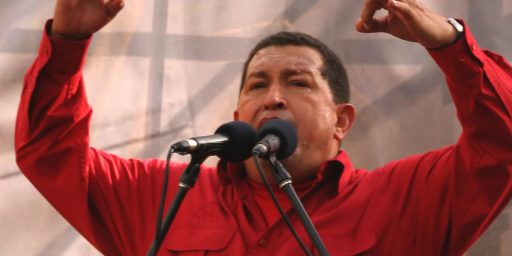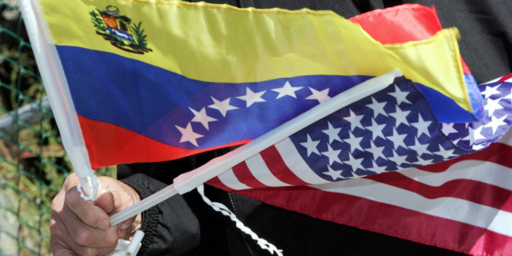More TV Politics in Venezuela
Cross-posted from
PoliBlog:
Via the BBC: Second Venezuela TV is under fire
Venezuela’s government has accused a TV station of inciting a murder attempt on President Hugo Chavez, hours after taking another network off the air.
It said footage shown on Globovision implicitly called for Mr Chavez to be killed. The station denies the claim.
It would appear that the government is watching television rather closely these days, and with an interpretative eye. The call for assassination was as follows:
Communications Minister William Lara said Globovision had called for the death of Mr Chavez by airing footage of the 1981 assassination attempt against Pope John Paul II with the song “This Does Not Stop Here” sung by Ruben Blades, now Panama’s tourism minister.
“The conclusion of the specialists … is that (in this segment) they are inciting the assassination of the president of Venezuela,” Mr Lara said, as he filed a lawsuit against the news network at the state prosecutor’s office.
Now, granted, all I have to go by is the description above, but it does strike me as something of a stretch (to put it mildly) that the footage described could be interpreted as a call for Chavez’s death.
Further, the notion that the Communications Minister’s “specialists” are so closely monitoring Venezuelan TV looking for possible slights of President is odd at best. Given the RCTV situation, one wonders if the government isn’t looking for reasons to shut down other private stations.
Indeed, it is worth noting that the accusations come in the context of the following:
Globovision was the only TV station to air footage of a large demonstration against the government’s growing control over the media.
While they are at it, the government is suing CNN:
The government was also suing the US station CNN for allegedly linking Mr Chavez to al-Qaeda, Mr Lara said.
“CNN broadcast a lie which linked President Chavez to violence and murder,” he said.
In a statement, CNN said they “strongly deny” being “engaged in a campaign to discredit or attack Venezuela”.
The Houston Chronicle has more on the CNN issue:
Venezuela’s government asked the attorney general to investigate Time Warner’s Cable News Network and local television station Globovision for “lies” and inciting violence against President Hugo Chavez.
Communications and Information Minister Willian Lara said CNN last week falsely portrayed a Mexican protest as being in Caracas and displayed images of Chavez alongside an al-Qaida leader.
[…]
“This is an effort to associate Hugo Chavez with two things, violence and death,” Lara said in a televised news conference today in Caracas. “CNN lies about Venezuela.”
The Chávez government’s interest in controlling media and the media message about the administration is, at a minimum, unhealthy for democracy and pluralism in Venezuela. More specifically it is troublesome that the government acts as if its job is to protect Chávez’s public image continues to make it look as if the goal is build a cult of personality around him. Leaders in democracies are supposed to suffer the slings and arrows of often vicious criticism as if it doesn’t bother them. And certainly they are not supposed to send government functionaries after media outlets for perceived slights. If factually incorrect information is disseminated then the administration in a democracy is supposed to simply try and present a case for their interpretation–they aren’t supposed to send the AG after the offending party.
Of course, I think that the public criticism of Globovision is clearly an attempt to creating a chilling effect in Venezuela’s public discourse. The message is clear: the government just shut down RCTV as a broadcast entity under the argument that it illegally challenged the government. Now Globovision is being accused of promoting the assassination of the President (after being the only station to show the anti-government protests over the RCTV situation). That is not coincidence and it is clearly a warning shot across the bow of Globovision and other media outlets in Venezuela.
The CNN move is probably more about propaganda about standing up to the Big American News Network.




The CNN business looks like a win-win for Chavez. If DOJ finds anything work taking to court, Chavez wins points in a public trial of CNN. If nothing is found, Chavez wins points for showing how “corrupt” the US justice system is. Either way, the Anglos lose.